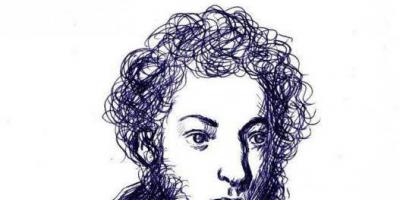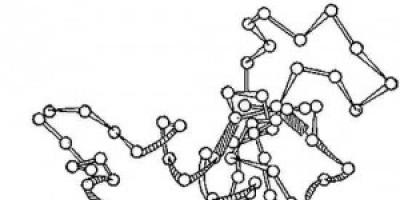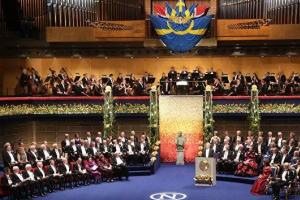1. How does Pushkin portray the magician? What epithets express the author’s attitude towards him? How does A.S. Pushkin’s “Song of the Prophetic Oleg” differ from the chronicle legend?
2. Read the dialogue between Oleg and the magician in their faces. Think about how to convey Oleg’s confidence in his strength and power and the pride and dignity that sound in the magician’s answer.
3. What descriptions of the heroes and individual words of the ballad help the reader to be imbued with the spirit of distant antiquity and “see” our ancestors?
in his Tsaregrad armor, the Prince rides across the field on a faithful horse. From the dark forest, towards him, comes an inspired magician, an old man obedient to Perun alone, a messenger of the covenants of the future, who has spent the entire century in prayers and fortune-telling. And Oleg drove up to the wise old man. “Tell me, magician, favorite of the gods, What will happen to me in life? And soon, to the joy of my neighbors-enemies, will I be covered with earth at Mogilnaya? Reveal to me the whole truth, do not be afraid of me: You will take a horse as a reward for anyone.” “The Magi are not afraid of powerful rulers, And they do not need a princely gift; Their prophetic language is truthful and free and friendly with the will of heaven. The coming years lurk in darkness; But I see your lot on your bright brow. Now remember my word: Glory to the Warrior is joy; Your name is glorified by victory; Your shield is on the gates of Constantinople; Both the waves and the land are submissive to you; The enemy is jealous of such a wondrous fate. And the deceptive wave of the blue sea In the hours of fatal bad weather, And the sling, and the arrow, and the crafty dagger The years spare the winner... Under the formidable armor you know no wounds; An invisible guardian has been given to the mighty. Your horse is not afraid of dangerous work; He, sensing the master's will, now stands quietly under the arrows of enemies, now rushes across the battlefield. And the cold and the slashing are nothing to him... But you will accept death from your horse.” Oleg grinned, but his forehead and gaze were darkened with thought. In silence, leaning his hand on the saddle, he dismounts from his horse, gloomy; And a faithful friend is stroked and patted on the neck with a farewell hand. “Farewell, my comrade, my faithful servant, The time has come for us to part; Now rest! No foot will ever step into your gilded stirrup. Farewell, be comforted - and remember me. You, fellow youths, take a horse, Cover it with a blanket, a shaggy carpet, Take it to my meadow by the bridle; Bathe; feed with selected grain; Give me spring water to drink.” And the youths immediately departed with the horse, and they brought another horse to the prince. The prophetic Oleg feasts with his retinue at the merry clink of a glass. And their curls are white as morning snow Above the glorious head of the mound... They remember days gone by And the battles where they fought together. “Where is my friend? - said Oleg. - Tell me, where is my zealous horse? Are you healthy? Is his running still as easy? Is he still the same stormy, playful person?” And he listens to the answer: on a steep hill, he has long fallen into deep sleep. Mighty Oleg bowed his head and thought: “What is fortune telling? Magician, you lying, crazy old man! I would despise your prediction! My horse would still carry me.” And he wants to see the horse's bones. Here the mighty Oleg rides from the courtyard, With him Igor and the old guests, And they see - on a hill, near the bank of the Dnieper, Noble bones lie; The rain washes them, the dust covers them, and the wind stirs the feather grass over them. The prince quietly stepped on the horse’s skull and said: “Sleep, lonely friend! Your old master outlived you: At the funeral feast, which is already not far away, It’s not you who will stain the feather grass under the ax and water my ashes with hot blood! So this is where my destruction was hidden! The bone threatened me with death!” From the dead head the grave snake, Hissing, meanwhile crawled out; Like a black ribbon wrapped around his legs, And the stung prince suddenly cried out. The circular ladles, foaming, hiss at the mournful funeral of Oleg; Prince Igor and Olga are sitting on a hill; The squad is feasting on the shore; The fighters remember the days gone by and the battles where they fought together. 1). Prepare a detailed answer to the questions: what did the magician tell about the life of the prince?, compare the texts of the ballad and the chronicle. , what do you see as the difference and what do they have in common? 2). How is the relationship between the “mighty ruler” and the “wise old man” revealed in their dialogue? What can you say about each of them and who do you think is more attractive? Whose side is the author on? help me please
According to various legends, he was buried near Staraya Ladoga. As the locals say, one of the ancient hills is the grave of the famous prince. Why "prophetic"? So he was called for his brilliant quality of foreseeing the situation. It was especially evident when, having unfurled the sails and put the ships on wheels, he reached his intended goal, one might say, quickly. It is not for nothing that Pushkin’s ballad “The Song of the Prophetic Oleg” is included in the school curriculum after studying “The Tale of Bygone Years” - this makes it possible to compare two identical events described by different sources.
History of creation
Why does Pushkin even turn to such distant events? An analysis of “The Song of the Prophetic Oleg” cannot be carried out without delving into the poet’s goals.
Pushkin's freedom-loving poems served as a reason for Alexander I to send the poet into exile to the south by decree of Alexander I. He visits many ancient cities, including Kyiv. Here the poet became interested in one of the ancient mounds. Local residents claimed that this was the grave of someone who died a very mysterious death.
Pushkin studies the works of Karamzin, where he retells the plot of “The Tale of Bygone Years” about the death of the glorious ruler.
This is how his “Song of the Prophetic Oleg” was born. The year it was written is 1822.
We should not forget that Pushkin was a true connoisseur of history. His works about “the affairs of bygone days” are very numerous. In Oleg, he saw, first of all, a hero capable of uniting Rus' and raising patriotic feelings.
Legend and plot
Any literary work of a historical nature is based primarily on historical facts. However, the vision of a writer or poet may differ from the original source: he can bring his own assessment, give life to events, even embellish them somewhere.
The plot of Pushkin’s ballad is similar to that which represents During the next campaign, a sorcerer, a magician, turns to the Grand Duke, the prophetic Oleg. He predicts that the master will meet death from his beloved horse, with whom he fought many battles.

Oleg immediately orders his faithful friend to be taken away, but orders that he be well looked after.
Next we see Oleg, already gray-haired. During the feast, he remembers his faithful friend - the horse. He is informed that the animal has died. Oleg decides to visit the resting place of his faithful friend and ask for forgiveness. The prince comes to the bones of the horse, is sad and lamented. At this time, a snake crawls out of the skull and inflicts a fatal bite.
The work ends with Oleg's funeral.
Features of the genre
If we carry out a genre analysis of the “Song of the Prophetic Oleg”, it will become clear that, by its definition, this is a poetic work based on some historical or other event. Often the plot is fantastic.
Another feature of the ballad is the dramatic nature of the events depicted and the unexpected ending. Pushkin embodied all this in his work. “The Song of the Prophetic Oleg” contains a lot of fantastic things, starting with the old magician, his prophecy and ending with the death of the prince.

The poet himself, immediately reading about this event, saw in it a plot for his future work. He wrote about this to Alexander Bestuzhev, noting “a lot of poetry” in the story of the death of the famous prince.
Subjects
Let's consider what the “Song of the Prophetic Oleg” represents at the semantic level. The theme of the work does not fit into any one concept. Pushkin raises various topics:

Idea
Analysis of the “Song of the Prophetic Oleg” is impossible without an ideological outline. What does Pushkin want to say with his work? First of all, about the predetermination of what happens to a person. No matter how hard we try to push away evil rock, it will still overtake us.
Yes, Oleg was able to delay the moment of death by moving his horse away from him and not contacting him. However, death still overtakes the prince. Thus, Pushkin is trying to reveal a very important philosophical problem that great minds have thought about. Fate and freedom: how are these concepts related? Does a person really choose his own destiny (Oleg sends his horse away) or is it impossible to deceive fate (the death of the prince), as Pushkin believes? “The Song of the Prophetic Oleg” clearly answers: everything that happens to people and is destined for them from above cannot be changed. The poet was convinced of this.
Artistic and expressive means
Let us analyze the “Song of the Prophetic Oleg” based on the means of expression used. Pushkin gave the legend from The Tale of Bygone Years his own vision, revived it, and made it sparkle with all its facets. At the same time, he conveyed the verbal flavor of Rus' in the 10th century.
Even the name itself is already poetic. "Song" is a method of worship that dates back to ancient times. Folklore works that came to us through the centuries immediately come to mind.

To convey the flavor of that era, special syntactic constructions are used in the speech; the poet’s speech is replete with archaisms (“trizna”) and archaic phrases (“feather grass”).
The text in Pushkin contains many apt epithets, which he carefully worked on (the poet's drafts remain). Thus, the original epithet “proud” as applied to the old sorcerer was replaced by “wise”. This is really so, because Oleg is proud and arrogant, and the magician is calm and majestic. Let us also indicate the most striking epithets: “glorious head of the mound”, “inspired magician”, “prophetic Oleg”. Metaphors are also abundant in the ballad: “the years are hidden in the darkness”, personifications: “the buckets are making noise.”
The poem is written in an even and calm amphibrach, characteristic of lyric-epic works. It slowly tells the story of the sad fate of Prince Oleg.
Each of A. S. Pushkin’s poems, placed in the textbook for the fifth grade, expresses one or another feeling that reveals his attitude towards his homeland. In the stanza from “Eugene Onegin,” love for Moscow is openly expressed, a city that is dear to the “Russian heart.” “Winter Morning” expresses the joy of feeling oneness with one’s native nature. In the poem “Nanny,” the poet turns with tenderness and care to Arina Rodionovna, who for him personifies all the best that exists in the common people. And, finally, “The Song of the Prophetic Oleg” is a manifestation of Pushkin’s interest in the past of his fatherland.
Turning to the “deep legends of antiquity,” he poetically reproduces the picture of life and customs of those distant years, when people naively believed the predictions of the magicians (we will reveal the semantic relationship of this word to the fairy-tale “miracle”), when they had many gods, and Perun was considered the main one , when they had to repel the attacks of foreign tribes and go on campaigns against them in order to protect their native land from new invasions.
The legend of Oleg's death was known to Pushkin from his youth. Probably its dramatic nature could have captured the poet’s imagination. It is significant that he created his “Song...” in 1822 in exile in the south, having directly seen the region where the action of his poetic ballad unfolds. Three years later (in 1825), the poet expressed his attitude towards the legend in a letter to Bestuzhev: “The old prince’s comradely love for his horse and concern for his fate is a feature of touching innocence, and the incident itself, in its simplicity, has a lot of poetic " However, when reworking the legend, Pushkin singled out not only this motive; next to Oleg, an “inspired magician” appeared, whose image is of particular significance.
The plot side of the poem is fascinating for students: you can notice how much they like the mystery of the prediction, how with pleasure and sadness they listen to the words of Oleg’s farewell to the horse, how tensely they await the denouement, mentally imagining a “coffin snake” crawling out from under the skull. All this, however, only happens if the teacher, when reading the poem, strives to convey the drama of the magician’s prediction and Oleg’s death. Therefore, taking care of the expressiveness of reading is very important when preparing for a lesson. A good reading by the teacher ensures that students are interested in the poem and that they want to understand and imagine everything.
It is necessary to construct the analysis in such a way that, by activating the imagination and empathy of the children, lead them to a feasible, but quite serious understanding of the “Song of the Prophetic Oleg.” It is important from the very first moment of the lesson not to get carried away by the historical basis of the work, the enumeration of military personnel. customs of antiquity or a detailed dictionary commentary (in particular regarding weapons: the study of epics prepared the understanding of such words as “shield”, “chain mail”, “axe”, etc.).
Let’s try to better resurrect before them not so much history as the poetry of that distant time conveyed by Pushkin. The teacher formulates for himself a methodological task that must be implemented in the process of analysis: to reveal to schoolchildren the features of Pushkin’s artistic and poetic depiction of events in comparison with the chronicle narrative.
(1 option)
A.S. In 1822, Pushkin wrote “The Song of the Prophetic Oleg,” which is based on a historical event. Pushkin himself called his work “Song...”, emphasizing the connection with oral folk art and pointing out an important feature of the work - the desire to glorify “the deeds of bygone years, the traditions of deep antiquity.”
The writer’s position is revealed through the use of various artistic and expressive means in the songs: epithets (“prophetic Oleg”, “formidable armor”, “on a bright brow”, etc.), metaphors (“you know no wounds”, “years
They lurk in the darkness”, etc.), comparisons (“a grave serpent…like a black ribbon”), personifications (“a crafty dagger”, “circular buckets, foaming, hissing”, etc.). To convey the flavor of the era and create the atmosphere of that time, outdated syntactic and stylistic constructions are used:
Here comes the mighty Oleg from the yard,
Igor and old guests are with him,
And they see - on a hill, on the banks of the Dnieper,
Noble bones lie...
The text contains a lot of archaisms and Old Slavonicisms: “at the mournful funeral funeral”, “you will stain the feather grass under the ax”, “and the cold and the flogging will do nothing to him”, etc.
Portraying the characters in the song, A.S. Pushkin pays special attention
Some specific trait of the hero. For example, Prince Oleg is “prophetic”, since on the one hand his fate is known, notified, on the other hand it is predetermined, and indeed, it is not in the power of the prince to change it.
The magician plays in the work the role of a wise old man, independent of worldly life, therefore he is “submissive to Perun... alone, a messenger of the covenants of the future.” Oleg's horse is both his best comrades during difficult battles and a symbol of death, from which the prince is destined to die:
Your horse is not afraid of dangerous work...
Then he rushes across the battlefield.
And the cold and slashing are nothing to him...
But you will receive death from your horse.
“Song about the prophetic Oleg” A.S. Pushkin was written in amphibrachium. Amphibrachic verses are distinguished by a smoother intonation compared to other poetic meters, and therefore this size is used, as a rule, when narrating in lyric-epic genres.
The noted artistic features allow us to attribute the work of A.S. Pushkin’s “Song of the Prophetic Oleg” to the best examples of artistic creativity.
(Option 2)
The chronicle does not give an idea of the character of the people described. The chronicler is called upon to be objective, he lists facts, but a work of art is subjective, since this is the author’s point of view on an event or the personality of the hero. The text may not contain a direct author's description of the character, but the means that the author chooses to create his work already tell a lot to the attentive reader.
The vocabulary used by Pushkin helps us to immerse ourselves in the world of the era described: “now”, “gathering”, “magi”, “lord”, “gate”, “head”, “enemy”, “cutting”, “reposed”, “ feast." Historical authenticity of what is happening is given by well-known facts from Oleg’s life (the fight against the “unreasonable Khazars”, “the shield on the gates of Constantinople”). Solemnity is created with the help of the rhythm chosen by the author of the song: “How the prophetic Oleg is now gathering // To take revenge on the foolish Khazars...”. The spaces of the warrior prince and the magician are contrasted: one is always in the open, the other comes out to the prince from the dark forest, and Oleg himself goes to meet his fate: “And Oleg drove up to the wise old man.”
The fourth part of the text is occupied by the text of the prediction, which suggests that even the number of lines can tell us the significance for the author of a particular detail. The song has two talking characters - Oleg and the magician. Prophetic Oleg addresses the sorcerer, the horse (living and dead), and the squad. Even the thoughts of the prince are known to us thanks to the author: “What is fortune telling? // Magician, you lying, crazy old man! // I should despise your prediction!” The song contains many appeals (“magician, favorite of the gods”, “my comrade, my faithful servant”, “youth-friends”, “lonely friend”...), characterizing the attitude of the main character towards the one with whom he is speaking.
The work is small in volume and eventful, but still, when describing the grave, the author devoted two lines to the steppe landscape: “the rain washes them, the dust covers them, and the wind stirs the feather grass over them.” Epithets, as always, color the text: the forest is “dark”, the village is “light”, the sea is “blue”, the stirrup is “gilded”, the curls are “white”, the snake’s ribbon is “black”. Twice in the text of the song the scene of the feast is repeated, together with Oleg and already without him, “the fighters remember the days gone by and the battles where they fought together.” The word “remember” has two meanings: to say goodbye (to celebrate a wake) and to remember.
They remembered Oleg’s prophetic vision in the 19th century, and they still remember it now.
“The Song of the Prophetic Oleg” was written by Pushkin at the time of his creative heyday, in 1822. The poet worked on the creation of a not very long poem for almost a whole year, turning to the history set out in Volume V of Karamzin’s works. It is there that the biography of Oleg, the prince of Kyiv, who reached Constantinople and nailed his shield to the gates of the city, is retold.
The poem first saw the light in 1825: it was published in “Northern Flowers,” an almanac published by Delvig.
The main theme of the poem
The main theme on which, in fact, the plot is based is the theme of predetermination of fate and freedom of choice. This general concept has many complex shades that require consistent study.
The main event, the turning point in the life of the prophetic Oleg, is a meeting with a magician who predicts his death “from his horse.” This episode seems to split the prince’s entire existence into two parts: if earlier he acted in accordance with his idea of the world, was engaged in ordinary state affairs - for example, he was going to “take revenge on the foolish Khazars” - now he is forced to reckon with the information received. And Oleg makes a decision that seems to him the only correct one: he abandons his faithful horse, which was a companion in many battles, and changes to another.
This is a striking episode in which Pushkin, with his characteristic genius, draws the reader’s attention to an infinite number of significant little details. The image of Oleg is the image of a person who, despite his high position, is characterized by completely ordinary feelings and emotions. He does not want to die prematurely, but for the sake of self-defense he takes steps that are not the most pleasant for himself. He obviously loves his horse, gives the order to take care of him in every possible way, he is sad because of the need to part with his faithful friend, but the desire to live is much stronger.
The precautions turn out to be unnecessary: Oleg dies, as predicted, “from a horse”: a snake crawling out of the skull of an already dead animal stings the prince in the leg, and he dies.
There is a subtle and bitter irony hidden in this: the sorcerer’s prediction comes true one way or another. If Oleg had known what kind of death was in store for him, how would he have behaved then? Would he give up on his friend? How did the sorcerer’s prediction (asked for by him, by the way - to his own misfortune) change his life? Pushkin leaves these questions unanswered, leaving the reader to think about them on their own. At the same time, what is interesting is that Prince Oleg in the text is called “prophetic” - knowledgeable, capable of independently predicting the course of events. One gets the impression that the sorcerer’s prediction, which the prince could not unravel, is a kind of irony of evil fate.
Structural analysis of the poem
It’s not for nothing that the work is called “Song”. It belongs to the category of ballads - lyrical poems based on a historical figure or event. To recreate the appropriate atmosphere, Pushkin uses the melodic rhythm of an amphibrach with a complex rhyme pattern (a combination of cross and adjacent) and large-scale stanzas consisting of six verses. Numerous archaisms enhance the sense of historicity and focus the reader’s attention on it. The poem is characterized by deep emotional intensity.
Many epithets and unusual comparisons create a certain viscosity of the text, the reader can no longer skim the lines with his eyes, images, generously fueled by original personifications (a crafty dagger, for example), literally appear before the eyes. In addition, Pushkin uses outdated syntactic structures and varies the word order.
Conclusion
“The Song of the Prophetic Oleg” is a bright, multifaceted work. The poet talks about predestination and whether it is possible to avoid evil fate, talks about the human desire to resist fate and about the mistakes made on the way to this goal. The questions raised by Pushkin about fate, about human weaknesses, about sacrifices in the name of one’s life are important, and each reader finds answers to them independently.








